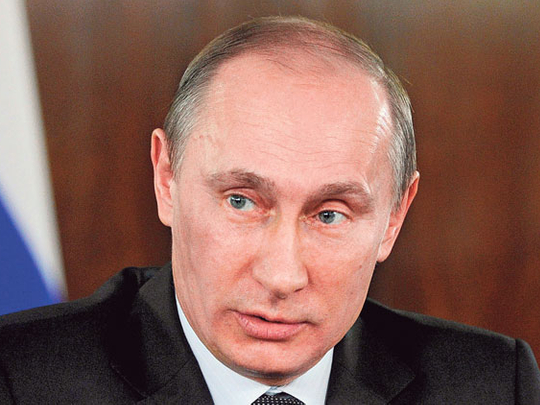
A cold and snowy December week in Moscow is always more interesting than pleasant, but I have not found the mood in the Russian capital so depressed since the collapse of the Soviet Union in 1991. Growing repression has made President Vladimir Putin more feared, but respect for him has plunged deeply as well. People who used to compare Putin with the stern Tsar Nicholas I, who ruled from 1825-1855 and built up the Russian secret police, now deride him as Paul I, the foolish and ineffective tsar who reigned for just five years before being murdered by his exasperated advisers in 1801, much to the relief of his subjects. Moscow is boiling with aggression and anger, but everybody is unhappy in their own way. A standard statement is: “We are in a dead end.”
Muscovites refer to Vladimir Lenin’s definition of a revolutionary situation: “When the upper classes can no longer govern, and the lower classes no longer accept living in the old way”. The mood is reminiscent of the late Brezhnev period, when nobody thought the system was sustainable, but nobody could see how things could change. Although discontent remains great, opposition protests have ebbed because people see no alternative, leader or programme. In the upper middle class, the dominant theme of conversation is when and where to emigrate. The future is abroad.
Paradoxically, Russia is doing very well economically. The wealth in Moscow is just astounding, not only with its 100 billionaires but also a vast middle class. Macroeconomic data are stellar. The consensus expected 2012 growth rate is 3.6 per cent, while neighbouring Europe is mired in recession. Russia has a budget surplus and almost no public debt, a huge current account surplus, and bulging international currency reserves. Admittedly, Russia thrives on large energy exports, but oil prices are high and likely to stay there. So why the sour mood?
The popular protests against Putin after the rigged parliamentary elections on December 4, 2011, seem to have pushed him out of balance. At his rambling, marathon press conference on December 20, he hardly answered any questions over the course of four and a half hours. Rather than being a guarantor of stability, Putin has suddenly become a source of destabilisation. His defensive actions include increased repression against political opposition, a faux campaign against corruption, an anti-American crusade, and obscurantist appeals to Russian nationalism and the Russian Orthodox Church.
In a populist vein, he agitates the poorest two-thirds of the population against the wealthy, well-educated and cosmopolitan. His fundamental problem is that he represents no real values and therefore lacks any source of legitimacy other than stability and economic growth that will not last forever. Like many authoritarian leaders, Putin presents himself as a convinced democrat, stating in his state of the union address: “For Russia there is no and can be no other political choice than democracy ....”
Yet, he quickly betrays his true feelings: “For Russia, the tradition of a strong state is characteristic.” And “Control is without doubt the most important function of the state.” Such talk is reminiscent of fascism.
Corruption in Russia is certainly out of control. Investment analysts privately estimate standard kickbacks on government procurement at 70 per cent for pipelines, 50 per cent for roads, and 35 per cent for medical equipment. But for all his tough talk, Putin is widely seen as the main protector and beneficiary of corruption. Opposition leaders Boris Nemtsov and Vladimir Milov and his former junior business partner Sergei Kolesnikov have accused him of embezzling tens of billions of dollars. Never mind that — Putin has launched an anti-corruption campaign against senior officials.
The opening salvo was an investigation of embezzlement of $100 million (Dh367 million) against the then minister of fefence Anatoly Serdyukov. Former minister of agriculture Elena Skrynnik has been accused of being involved in fraud of $1.2 billion. Neither has been formally charged or arrested, only called as witnesses (though a deputy economic minister has been arrested for kickbacks of $500 million).
Other open fraud cases of about $200 million each involve city officials in St. Petersburg, the space agency, the state telecommunication company, and the Federal Property Management Agency, respectively. For any other country, such revelations would be big news, but not to the placid Russian elite. They comment privately that hundreds of billions of dollars have been stolen, and the biggest culprits are much higher up in the Putin hierarchy. Few think the former ministers will end up in prison. In his state of the union address, Putin started a new crusade, coining the term “de-offshore-isation.”
He called for a law “limiting the rights of civil servants and politicians to hold foreign bank accounts, securities and stocks”. All real estate holdings abroad have to be declared. Two days earlier, when discussing his anti-corruption campaign, Putin commented that “otherwise we would return to 1937”, referring to Stalin’s great terror. That is hardly reassuring.
Given that Putin is widely considered immensely corrupt and that he has tolerated ballooning corruption for years, it is somewhat surprising that he himself has started this campaign. Some argue that he has been forced to do something because corruption has reached a point at which the state no longer can be managed.
Others suspect that Putin has lost control, and that his top aides are pursuing personal vendettas. His own words suggest that he is planning a purge of the government. A major elite struggle is certainly taking place. Regardless of Putin’s goals or control, he is destabilising the elite. The families of thousands of top officials and businessmen are already abroad, and many senior people are preparing their own departure. Putin seems to welcome their emigration. But it is difficult to see any clear alternative. Perhaps that is why Moscovites are so grim.
— Washington Post
Anders Aslund is senior fellow at the Peterson Institute for International Economics.








